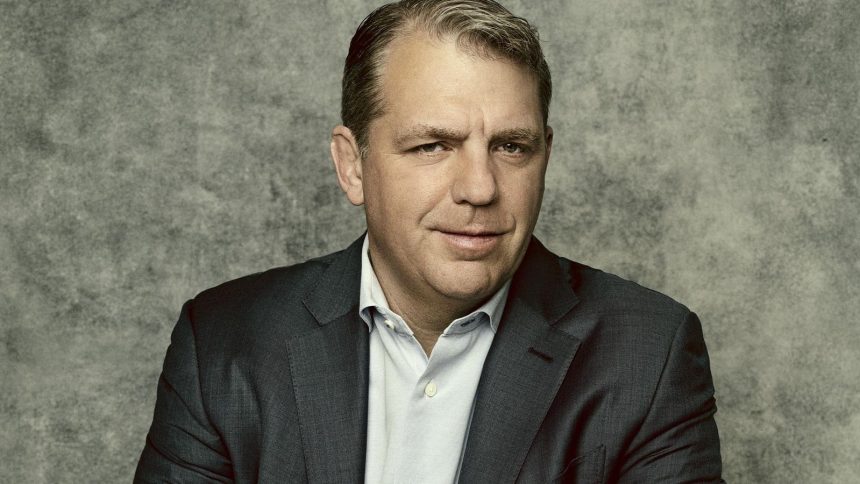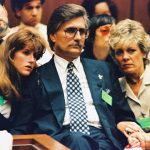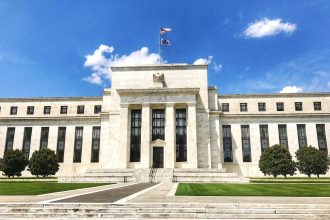Drawing from Warren Buffett’s playbook, Todd Boehly has used the cash generated from his boring–but dependable–annuities business to build a multibillion dollar sports and entertainment empire. His results have been dazzling.
By Maneet Ahuja, Forbes Staff and Hank Tucker, Forbes Staff
It’s just after sunset ahead of one of Hollywood’s biggest events—the 81st annual Golden Globe Awards—and billionaire investor Todd Boehly, the 50-year-old cofounder and CEO of $70 billion (assets) Eldridge Industries, is heading to the venue. Dressed in a black henley and blue jeans, he bypasses the red carpet and breezes past security on his way to the international ballroom of the Beverly Hilton, where the team at Dick Clark Productions awaits.
Inside, 20 video cameras and an array of stage lights are strategically stationed to ensure they can quickly zoom onto the faces of the night’s A-list attendees, whose names are plastered on large white cardboard cutouts positioned around the banquet tables. Taylor Swift is center right. Oprah Winfrey, Steven Spielberg and Bradley Cooper are to the left of the main stage, while Pedro Pascal and Timothée Chalamet are seated to their right. Onstage, a non-cardboard Kate Beckinsale is wearing sparkly platform sneakers while rehearsing her presenter lines with Don Cheadle.
Boehly seems oblivious to the bustle as a staffer goes over details of the next night’s agenda. A shrill ring from his phone interrupts: A prominent actor/producer is fuming over his assigned table.
With his graying blond hair slicked to the side, Boehly pauses and looks up. “I have teams that handle this stuff,” he says, dismissing the microcrisis. “Hollywood is wondering what the future is right now. If anything, this is a good sign that we’re on the way back.”
If the billionaire bond investor turned Hollywood mogul is feeling any pressure at the moment, it would be understandable. In 2021, the Golden Globes were investigated over corruption and a lack of Black voting members at its owner, the nonprofit Hollywood Foreign Press Association (HFPA). Tinseltown boycotted the awards ceremony, Tom Cruise returned his trophies and the show spent 2022 off the air. In January 2023, it returned to NBC for a one-year probationary run that delivered an underwhelming 6.3 million viewers, down from 18.4 million in 2020, according to Nielsen.
During the imbroglio, Boehly’s maneuvering was masterful. With the Globes’ popularity at a low and Hollywood actors and writers on strike, he went into distressed-investor mode.
In 2021, he got himself named interim CEO of the HFPA, then led a restructuring that transferred the Globes’ intellectual property to a for-profit entity. His holding company, Eldridge Industries, already owned a piece of the show’s producer, Dick Clark Productions, later joined by Penske Media. In June 2023, six months before the next awards ceremony, Boehly and Penske acquired the Globes outright. Under Jay Penske’s leadership they sold media rights to CBS and Paramount+ for six years.
Despite morning-after snipes over host Jo Koy’s jokes, Nielsen reported that the 2024 Golden Globes, which aired January 7, garnered 9.5 million viewers, a 51% increase over last year. The incremental growth was good enough for Boehly, whose Eldridge holdings also include Oscar-winning film distribution and production company A24, which took home three Globes that night for Beef, a Netflix miniseries starring Ali Wong.
Since forming Eldridge in 2015, Boehly has amassed a trove of more than 100 companies, including many in entertainment and sports, worth $10 billion. Among them: betting site DraftKings, Dick Clark’s Rockin’ Eve, Bruce Springsteen’s song catalog, the Beverly Hilton, fintech unicorn Stash and the Los Angeles Dodgers. Through a separate entity, BlueCo, Boehly is part of a group that bought Chelsea F.C., the British soccer club, from Russian oligarch Roman Abramovich for $3 billion in 2022. Forbes estimates Boehly’s net worth to be $6.1 billion, up $1.6 billion since 2022.
As his empire expands and becomes more studded with stars and celebrity athletes, Boehly always keeps Topeka, Kansas, at the back of his mind. That’s home base for Security Benefit Life, the $52 billion annuity specialist that provides the cash for Eldridge’s growth. Like Warren Buffett, Boehly uses the dependable cash thrown off from the insurance operation to buy up assets.
But unlike Buffett, who prefers mundane businesses like truck stops and ketchup, Boehly has applied the formula to glitzier sectors. Money can’t always buy wins, as he’s learning after two dismal years as the owner of Chelsea F.C., but it can buy eyeballs on a screen, which is mostly what matters after you’ve sold the media rights and the ultimate goal is generating the kind of income that allows the holders of retirement annuities to sleep soundly at night.
“I’ve always believed that the world doesn’t understand structured finance,” Boehly says. “One of the great things about being a lender is you have a front row seat to a lot of different industries.”
Todd Boehly has a recurring nightmare from his days on the high school wrestling team of Bethesda, Maryland’s all-boys Landon School. As a junior, he once missed his 140-pound weight class before a match by less than a pound, and his coach proceeded to scream at him. Decades later, he relives the trauma several nights each year.
“It’s a really big way to let your team down,” Boehly recalls. “Wrestling is pretty entrepreneurial. It’s all you. There’s nowhere to hide.”
As an outsider trying to muscle his way into the clubby world of private capital, Boehly’s Landon School lessons have served him well. He’s a 1996 graduate of William & Mary, majoring in finance, but with no connections to Wall Street (his father was an engineer, his mother an elementary school teacher), he took advice from his high school geometry teacher and headed to the London School of Economics for senior year abroad. After obtaining a special visa that allowed him to work while he studied, he landed an internship in the credit derivatives department of Citibank—then a backwater. That addition to his résumé was enough to land him a job upon graduation at CS First Boston in New York, working as an analyst structuring collateralized loan obligations (CLOs).
“I was sitting on the leveraged finance desk right in the middle of all the salesmen and traders and learned a ton,” Boehly says. “I was extremely stimulated by it.” After most of his bosses decamped for Bear Stearns in 1997, he was suddenly modeling and structuring high-yield CLOs himself at age 23. From First Boston, Boehly in 1999 moved to private equity shop J.H. Whitney, where he formed a bond with future billionaire Mark Walter, cofounder of Guggenheim Partners. While at Whitney, Boehly helped Walter restructure $600 million of Guggenheim’s collateralized bond obligations that held the near-worthless junk bonds of upstart telecoms during the dot-com bubble burst.
Walter was so impressed by Boehly that in 2001 he financed the young banker’s buyout of Whitney’s $1.5 billion credit business, folding it into Guggenheim, and put him in charge of its corporate bond portfolio. Boehly soon noticed that one of Guggenheim’s insurance clients’ largest holdings was in Enron bonds. So during the fall of 2001, he dug deep into Enron’s financial disclosures. “I built a model to understand what was driving their business,” he says. “They were selling off all their hard assets . . . trading fiber and going into these businesses that were completely unproven.”
Realizing that stripped of assets, Enron was entirely dependent on the beneficence of the capital markets, Boehly immediately recommended selling off the Enron bonds. However, Guggenheim’s insurance client, which was based in Texas like Enron, refused to sell. At first, the client seemed right. Just before Thanksgiving, Enron received an $8 billion buyout offer from Dynegy, which caused its bonds to pop from 90 cents to 97 cents on the dollar. The insurer’s CEO promptly called Boehly to tell him he was wrong. But Boehly trusted his analysis and advised him to sell again. A month later Enron was in bankruptcy and the bonds were trading in the 20s.
Over the next 15 years, Boehly built Guggenheim’s credit book to $60 billion and assumed responsibility of its asset management business, which acquired Security Benefit Life, Dick Clark Productions and a stake in the Dodgers. In 2011 he was named president.
“Todd in many ways embodies the creativity that Steve Ross had in building Time Warner or John Malone did in building TCI and Liberty,” says Michael Milken, the billionaire junk bond king of the 1980s and longtime client of Guggenheim Partners.
In 2015 Boehly decided to strike out on his own. Guggenheim was already a large shareholder in Security Benefit Life. Boehly, who understood the strength and power of tapping life insurance company balance sheets, struck a deal with Walter to buy the rest of the insurer and some other assets including Dick Clark Productions.
Boehly invested around $200 million of his own money and reached out to Swiss billionaire Hansjörg Wyss, a former client of his at Credit Suisse who had just sold his medical implant company to Johnson & Johnson for $20 billion. Wyss was in for $550 million. Boehly rolled his stakes into a new holding company called Eldridge and established himself as the controlling shareholder.
Like Warren Buffett’s Berkshire Hathaway, which generates large amounts of capital from Geico, insurance provides the fuel for Todd Boehly’s empire. Security Benefit Life currently has $52 billion in assets, and in 2023, its operating income of $1.1 billion was up 50%.
Most insurance companies invest the premiums paid by policyholders in publicly traded bonds, trying to match their long-dated liabilities with the securities they hold. A large percentage of Security Benefit Life’s assets, by contrast, are in the form of loans, leases and other structured debt held by Boehly’s 100-plus portfolio companies. According to SEC disclosures, at least $21 billion of Security Benefit Life’s $48 billion in assets as of the end of 2022 (the most recent available data) was invested in “related parties.” This includes $334 million in American Media Productions, which runs SportsNet LA, the regional sports network that airs Dodgers games. American Media Productions was created by the team’s new ownership group, led by Walter and Boehly, shortly after they bought the Dodgers in 2012.
Security Benefit Life also has $1.3 billion invested in Cain International, a London-based real estate firm co-owned by Eldridge. Cain has $16 billion in assets including the Beverly Hilton and Boston’s Raffles Hotel. Billions more have been invested in entities associated with Eldridge-owned asset management businesses like Maranon Capital, Panagram Structured Asset Management and Stonebriar Commercial Finance. The spider web is a bit baffling. In all, Security Benefit Life’s annuity filings list more than 1,500 “common control” entities over 30 pages, ranging from A24 Films and FlexJet, which sells fractional ownership in private planes, to the Soul Train Cruise, run out of Fort Lauderdale, Florida, and Thirteenth Floor Entertainment, owner of attractions like Fear Farm, a “haunted fairground” in Phoenix.
That naturally leads to hundreds of millions being paid annually in intercompany fees. Why pay an investment banker or management consultant when you can keep it all in the Eldridge family? From 2018 through 2022 Security Benefit Life paid more than $550 million in fees to Boehly’s Eldridge Business Services for things like investment strategy, asset origination and new product development.
“I have a lot more control. . . . The bonds you can buy sitting in a seat waiting for an investment bank to call you are much less attractive than the stuff that you can go out, originate and create,” Boehly says. Eldridge earned a $350 million dividend from Security Benefit Life in 2023.
Boehly boasts that he is less leveraged than his peers, with an assets-to-equity ratio of roughly six. “If you run with a lot less leverage and therefore much more capital, you have much more flexibility in how you can manage the assets,” he says, citing as one example buying claims on the defunct crypto exchange FTX in 2023 that were trading at 35 cents on the dollar. Thanks to a surge in crypto prices, they’re now at 90 cents.
Eldridge was also an early investor in DraftKings, the sports gambling outfit, beginning with its Series C round in December 2014, and it led a $100 million round in March 2017. Eldridge has realized $498 million in gains on its $49 million investment, and it still owns a small stake in the stock, which has tripled since the start of 2023.
“I have very sticky, long-dated liabilities,” says Boehly of the annuities that fund his asset buying.
Nowhere has the math behind Boehly’s insurance-powered strategy been more innovative than in his investments in professional sports. A lifelong baseball fan who grew up idolizing the Baltimore Orioles’ Cal Ripken Jr., Boehly became interested in the Dodgers after the team filed for bankruptcy in June 2011. The team was asking for $150 million to help cover player and employee salaries amid an ugly feud between then-owner Frank McCourt and the league office. McCourt agreed to a court-supervised process to sell the franchise and its media rights that November.
After years of lending to production companies—and with the Dodgers’ media rights due to be renegotiated—Boehly knew that part of the deal was undervalued. While at Guggenheim, he joined Walter in a record $2 billion acquisition of the team in 2012, with Boehly owning a personal 20% stake and another 7% through Eldridge. They spent freely right away, trading for high-priced stars like Adrián González and Hanley Ramírez during their first summer of ownership to get more fans in seats—and, more vitally, watching on TV. In 2013, the Dodgers sold 25 years of media rights to Time Warner Cable for the eye-popping sum of $8.4 billion and created SportsNet LA to broadcast games.
“Because Time Warner, which is now part of Charter, was an investment-grade credit, they were able to discount the payments. . . . The present value of that incremental revenue stream was close to the value they paid for the Dodgers,” Milken says. “It was a transaction that showed creativity, an understanding of the capital structure and the best way to finance a company.”
That cash has helped the Dodgers build a consistent winner, making 11 consecutive playoff appearances since 2013. In 2020, they won their first World Series in three decades. Forbes now values the team at $4.8 billion, 140% more than Walter and Boehly’s group paid for it.
The 10-year, $700 million contract the Dodgers shelled out in December 2023 for Shohei Ohtani was the largest ever in American professional sports, but there was a major catch that helped the Dodgers get even richer. Ohtani, who spent his first six years playing for the crosstown Los Angeles Angels, agreed to take just $2 million per year from the Dodgers for the first 10 years of the contract, deferring $68 million to each year from 2034 through 2043.
Baseball’s biggest star, who is currently embroiled in a gambling scandal involving his interpreter, pulls in more than enough endorsement money to live comfortably for the next decade, but the contract structure means its present value—using MLB’s 4.4% discount rate—is a “mere” $46 million per year. The structure was so friendly to the Dodgers that president of baseball operations Andrew Friedman said when the signing was announced that he “wouldn’t have had the guts to propose it.”
“Ohtani cares a lot about winning and we care a lot about winning, so our passion and his passion lined up really nicely,” says Boehly, knowing how advantageous the deal structure is to his team, especially if the Federal Reserve is unsuccessful in taming inflation.
The next step was winning a bidding war for Japanese pitcher Yoshinobu Yamamoto, handing him a 12-year, $325 million contract in late 2023. The team of Goliaths will be the villains of the coming season, but the storyline provides a jolt to a sport in desperate need of one following last fall’s record-low World Series viewership.
“On average, 9 million people watched the five World Series games last year. We had roughly 70 million people view Ohtani’s press conference,” Boehly points out. “He sold more jerseys than [Miami soccer star Lionel] Messi in the 48 hours after the announcement.”
Ten years after buying his piece of the Dodgers, and a year after acquiring a minority stake in the Los Angeles Lakers in 2021, Boehly jumped at a unique opportunity to add another sports jewel to his crown. Roman Abramovich, facing sanctions imposed by the British government after Russia’s invasion of Ukraine in February 2022, said he would sell his soccer club, Chelsea F.C., with the net proceeds going to a foundation to benefit victims of the war.
Boehly became fascinated with English Premier League soccer while working on real estate deals in London in the early 2010s. Jonathan Goldstein, Guggenheim’s former head of European real estate and now CEO of Cain International, got him hooked. He made a nearly $3 billion bid for Chelsea that Abramovich rejected in 2019, but like a shrewd vulture investor, he moved fast three years later. In May 2022, Chelsea announced it was being sold to a group led by Boehly, Walter, Wyss and private equity firm Clearlake Capital in a deal valuing the club at $3.1 billion.
“The Premier League is broadcast into basically every country in the world. I think North Korea and Russia are the only ones that don’t broadcast it,” Boehly says. “It’s uniquely positioned on the clock in the U.S. because on Saturday morning, there’s not a lot of competition.”
Boehly’s group has spent more than $1.3 billion luring star players like Enzo Fernández and Moisés Caicedo to Chelsea, but unlike with the Dodgers, success hasn’t followed. Typically a perennial contender, Chelsea finished just 12th in the Premier League in the 2022-23 season, its worst finish in 29 years, and is mired in 11th place this year. Two managers were fired during Boehly’s first season in charge. London tabloid The Sun panned one humiliating loss last year as DIABOEHLYCAL, and during matches fans occasionally break into chants that vulgarly describe Boehly as a part of human anatomy.
“We just need to let the process develop and give them the time to go from being unbelievable individual players with great skills to fold into a team,” Boehly says. “The good news is people care so much. And the bad news is people care so much. That leads to times when they’re frustrated with the team and the owners. I get that, but we just have to continue to stay the course.”
Not that it really matters. Love him or hate him, Todd Boehly knows that so long as fans show up or tune in, his annuity-holding backers will get paid—and his billions will continue to grow.
MORE FROM FORBES
Read the full article here
















